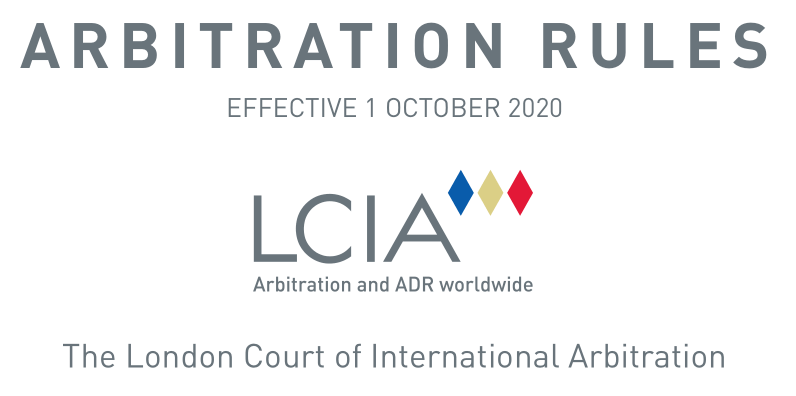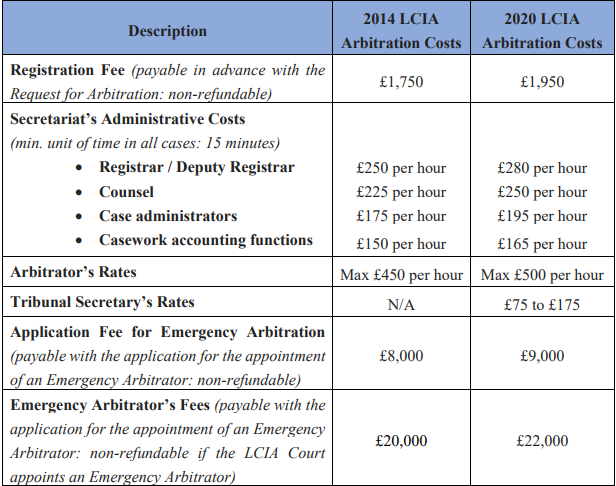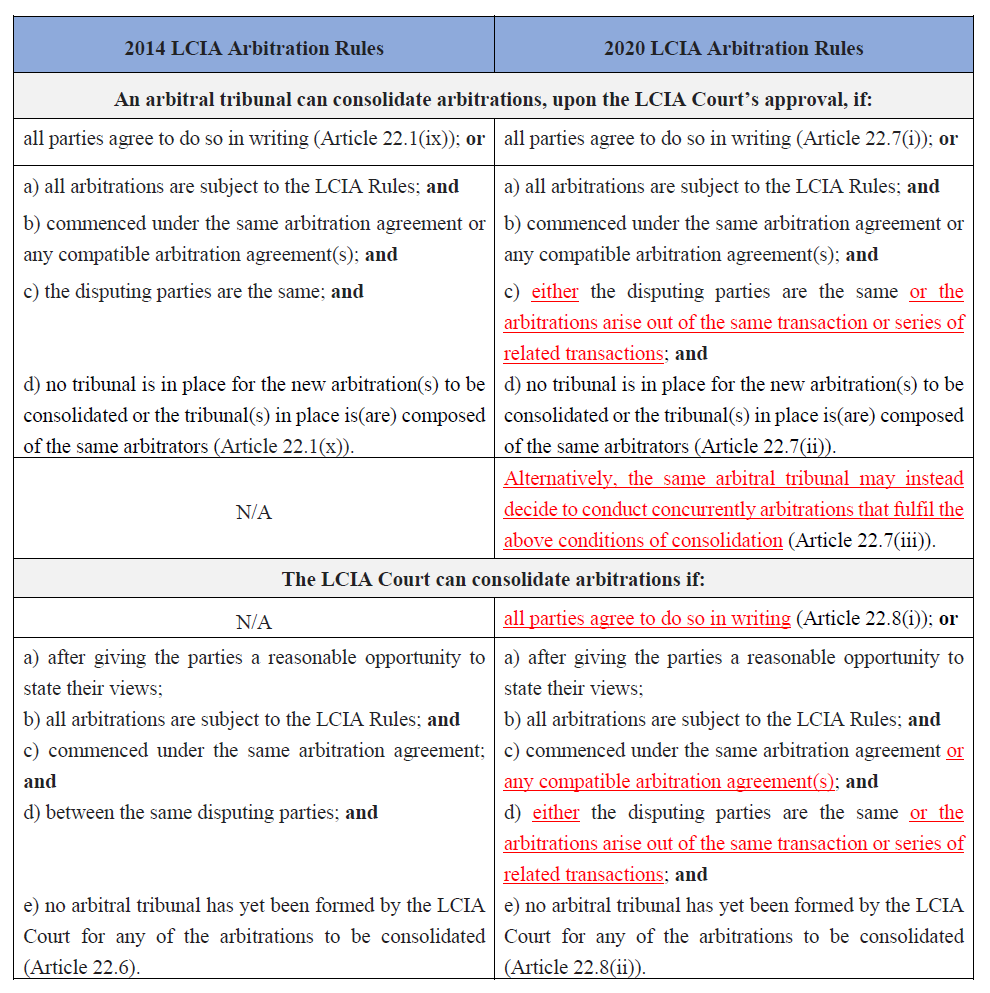On 11 August 2020, the LCIA released a surprisingly ambitious update to its Arbitration Rules (the “2020 (LCIA Arbitration) Rules”) and a new Schedule of Arbitration Costs (the “2020 LCIA Schedule of Costs”), increasing the costs of LCIA Arbitration, among other notable changes.

The 2020 LCIA Arbitration Rules and the 2020 LCIA Schedule of Costs will take effect on 1 October 2020 and apply to all LCIA arbitrations commenced on or after that date, regardless of when the underlying arbitration agreement was concluded, unless the parties have expressly agreed that an earlier version should apply. The previous versions, currently in force, are the “2014 (LCIA Arbitration) Rules” and the “2014 LCIA Schedule of Costs”.
According to the LCIA’s official announcement, the updates “aim to make the arbitral and mediation processes even more streamlined and clear for arbitrators, mediators and parties alike.” The many notable amendments are discussed below.
1) Increased Costs
Under the 2020 LCIA Schedule of Costs, an increase in costs of 10% to 12.5% is evidenced when compared to the 2014 LCIA Schedule of Costs, as shown in the table below:

The LCIA comments on the increase of arbitrators’ rates that “[t]he £450 maximum hourly rate will be increased to £500, better to reflect the demands of users in certain cases involving complex and significant disputes.”
2) Broadening of Arbitral Tribunal’s and LCIA Court’s Power to Order Consolidation – Concurrent Conduct of Arbitrations – “Composite” Submissions
The 2020 LCIA Arbitration Rules adopt broader standards with respect to multi-party and multi-contract arbitrations.
In short, the 2020 Rules expand the arbitral tribunal’s and the LCIA Court’s power to order consolidation in cases where the parties are not the same, but their disputes arise out of the same or related transactions, which was not an option under the 2014 LCIA Arbitration Rules. The 2020 Rules also explicitly authorize the LCIA Court to consolidate arbitrations when the parties so agree in writing. Further, an entirely new feature is added allowing tribunals composed of the same arbitrators to conduct arbitrations on a concurrent basis without consolidating them.
A comparative table with the conditions of consolidation under the 2014 and 2020 Rules is shown below, where the changes introduced by the 2020 Rules are underlined in red.
In addition, the 2020 LCIA Arbitration Rules contain a new provision allowing a “composite Request” to be filed “to commence more than one arbitration under the LCIA Rules (whether against one or more Respondents and under one or more Arbitration Agreements)” (Article 1.2). Each arbitration so commenced shall proceed separately, unless determined otherwise. A “composite Response” may also be submitted in response to the “composite Request” (Article 2.2). Both “composite” submissions must identify separately the estimated monetary amount or value in dispute, the transaction(s) at issue and the claim, defence, counterclaim or cross-claim advanced against any other party in each arbitration.
3) Arbitral Tribunal’s “Early Determination”
Under Article 22.1(viii) of the 2020 LCIA Arbitration Rules, the tribunal is now empowered to “determine that any claim, defence, counterclaim, cross-claim, defence to counterclaim or defence to cross-claim is manifestly outside the jurisdiction of the Arbitral Tribunal, or is inadmissible or manifestly without merit; and where appropriate to issue an order or award to that effect (an ‘Early Determination’)”. This provision aims to expedite proceedings and to act as a deterrent to parties’ dilatory tactics.
4) Confidentiality
The confidentiality provision of the 2020 LCIA Arbitration Rules is wider in scope than the one currently in force. Under Article 30.1 of the 2014 LCIA Arbitration Rules, the parties commit “to keep confidential all awards in the arbitration, together with all materials in the arbitration”. Pursuant to Article 30.1 of the 2020 Rules, the parties are now also obliged to “seek the same undertaking of confidentiality from all those that it involves in the arbitration, including but not limited to any authorised representative, witness of fact, expert or service provider.” Under Article 30.2 of the 2020 Rules, the tribunal, any tribunal secretary and any expert to the tribunal is now explicitly bound by confidentiality as well.
5) Adaptation to the Digital Age
Several new additions are made in the 2020 LCIA Arbitration Rules to encourage the use of technological means. The LCIA notes that while the COVID-19 crisis “did not necessitate any change of direction or focus, it allowed the LCIA to address explicitly some changes in recent good practice, notably the increased use of virtual hearings and the primacy of electronic communication”.
- Primacy of Electronic Submissions
The new default format for parties to submit a Request for Arbitration and a Response is “in electronic form, either by email or other electronic means including via any electronic filing system operated by the LCIA. Prior written approval should be sought from the Registrar, acting on behalf of the LCIA Court, to submit the Request or the Response by any alternative method” (Article 4.1 of the 2020 Rules). Under the 2014 Rules, the parties had the option to submit a Request (Article 1.2) and a Response (Article 2.2) “in electronic form (as e-mail attachments) or in paper form or in both forms.”
- Primacy of Electronic Communication
Accordingly, unless otherwise determined, “any written communication in relation to the arbitration shall be delivered by email or any other electronic means of communication that provides a record of its transmission” (Article 4.2 of the 2020 Rules).
The parties and the arbitral tribunal are now also expressly encouraged to “make contact (whether by a hearing in person or virtually by conference call, videoconference or using other communications technology or exchange of correspondence)” (Article 14.3 of the 2020 Rules).
Arbitral tribunals are also given the express authority to employ “technology to enhance the efficiency and expeditious conduct of the arbitration (including any hearing)” (Article 14.6(iii) of the 2020 Rules).
Hearings can explicitly “take place in person, or virtually by conference call, videoconference or using other communications technology with participants in one or more geographical places (or in a combined form)” (Article 19.2 of the 2020 Rules).
- Electronically-Signed Awards
Unless otherwise determined, “any award may be signed electronically and/or in counterparts and assembled into a single instrument” (Article 26.2 of the 2020 Rules) and transmitted to the parties by the LCIA “by any electronic means, and (if so requested by any party or if transmission by electronic means to a party is not possible) in paper form” (Article 26.7 of the 2020 Rules). While the use of electronically-signed awards is encouraged, the parties may be required to submit a hard copy of the award before domestic courts in annulment and/or enforcement proceedings, which is a common condition found in national procedural laws.
6) Exclusive Jurisdiction of English Courts for LCIA-Related Disputes
A novel addition to the 2020 LCIA Arbitration Rules is Article 31.3, which gives exclusive jurisdiction to the courts of England and Wales to hear and decide any action, suit or proceedings arising between the parties and the LCIA, the LCIA Court, the LCIA Board, the Registrar, any arbitrator, tribunal secretary or expert for matters arising out of or in connection with an LCIA arbitration. In particular, under Article 31.3, any party agreeing to LCIA arbitration “irrevocably agrees” to the exclusive jurisdiction of the English courts.
In addition, Article 16.5 of the 2020 Rules provides that “the LCIA Rules shall be interpreted in accordance with the laws of England.” No such provision is found in previous versions.
7) Authorised Representatives
The term “Legal Representatives” used in the 2014 LCIA Arbitration Rules (Article 18, among others) is now replaced by the broader term of “Authorised Representatives” to include non-legally qualified personnel commonly involved in arbitrations, avoiding any ambiguity in this respect.
Accordingly, the Annex to the 2014 LCIA Rules entitled “General Guidelines for the Parties’ Legal Representatives” has now been renamed the “General Guidelines for the Authorised Representatives of the Parties”, yet the provisions contained therein remain the same, “intended to promote the good and equal conduct of the authorised representatives of the parties appearing by name within the arbitration” (paragraph 1 of Annex to the 2020 Rules).
Another notable update of the 2020 Rules is Article 18.3, which subjects “any intended change or addition by a party to its authorised representatives”, commonly seen in practice, to the approval of the arbitral tribunal. In practice, a tribunal is unlikely to deny any change in authorised representatives, however, except in exceptional circumstances.
8) Explicit Consideration of Data Protection and Other Regulatory Obligations
- Data Protection
In the post-GDPR era, the 2020 LCIA Arbitration Rules aptly introduce a new explicit provision on Data Protection (Article 30A) to stress the need for compliance of all participants in an LCIA arbitration (be it parties, arbitrators, counsel, the LCIA itself or others) with any applicable data protection legislation.
Under Article 30.5, at an early stage of the arbitration, the arbitral tribunal shall consider, upon consultation with the parties and, if needed, the LCIA, whether it is appropriate to adopt “any specific information security measures to protect the physical and electronic information shared in the arbitration” and “any means to address the processing of personal data produced or exchanged in the arbitration in light of applicable data protection or equivalent legislation.”
Under Article 30.6, the LCIA and the tribunal “may issue directions addressing information security or data protection, which shall be binding on the parties, and in the case of those issued by the LCIA, also on the members of the Arbitral Tribunal”.
- Compliance with Regulatory Obligations
The newly-inserted Article 24A entitled “Compliance” aims, as its name suggests, to highlight the need for compliance with regulatory obligations relating to “bribery, corruption, terrorist financing, fraud, tax evasion, money laundering and/or economic or trade sanctions (‘Prohibited Activity’)”.
The LCIA may refuse to deal with a Party engaged in any Prohibited Activity (Article 24.10 of the 2020 Rules) and it “may take any action it considers appropriate to comply with any applicable obligations relating to Prohibited Activity, including disclosure of any information and documents to courts, law enforcement agencies or regulatory authorities” (Article 24.11 of the 2020 Rules).
While the obligations arising out of data protection laws, economic sanctions and other regulatory regimes are applicable regardless of the newly-inserted provisions, their explicit acknowledgment in the 2020 Rules is a welcome addition.
9) Nationality for the Purposes of Appointing Sole or Presiding Arbitrators
Under Article 6.1. of both the 2014 and 2020 LCIA Arbitration Rules, the sole arbitrator or the presiding arbitrator shall not have the same nationality as any party, unless the party with the same nationality so agrees.
Article 6.2 of the 2020 Rules now defines the term “nationality” for the purposes of appointing a sole arbitrator or presiding arbitrators as follows:
For a natural person, nationality means “citizenship, whether acquired by birth or naturalisation or other requirements of the nation concerned.”
For a legal person, nationality now means “the jurisdiction in which it is incorporated and has its seat of effective management. A legal person that is incorporated in one jurisdiction but has its seat of effective management in another shall be treated as a national of both jurisdictions. The nationality of a party that is a legal person shall be treated as including the nationalities of its controlling shareholders or interests.”
10) Other Updates
Several other updates are made to the 2020 LCIA Arbitration Rules, such as the inclusion of explicit provisions addressing the role of tribunal secretaries (Article 14A).
- Correction of Mistakes in Submissions
Another change is that, under the 2020 Rules, at any time after the “Commencement Date” (as defined in Article 1.4), but prior to the appointment of the arbitral tribunal, the LCIA Court may allow parties “to supplement, modify or amend” the Request for Arbitration (Articles 1.5) and the Response (Article 2.5) “to correct any error in computation, any clerical or typographical error, any ambiguity or any mistake of a similar nature”.
- Correction of Awards
The arbitral tribunal is also now allowed to correct an award and issue an addendum (called a “memorandum” under the 2014 Rules) not only when a request for correction of “any error in computation, any clerical or typographical error, any ambiguity or any mistake of a similar nature” is considered justified, as was the case under the 2014 LCIA Arbitration Rules (Article 27.1), but also when such request is deemed unjustified (Article 27.1 of the 2020 Rules). When a request for an additional award is considered unjustified, the tribunal is now also empowered to issue an addendum to the award (Article 27.3 of the 2020 Rules), while making a ruling on costs related to the request.
* * *
In sum, the ambitious amendments introduced by the 2020 LCIA Arbitration Rules cover a wide range of issues, reflect changes in recent good practice, such as the increased use of electronic communication and virtual hearings, and should enhance the efficiency of arbitral proceedings. The 10% to 12.5% increase in costs is the price to pay for the new procedures, however.
